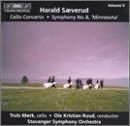| All Artists: Harald Saeverud, Ole Kristian Ruud, Stavanger Symphony Orchestra, Truls Mork Title: Cello Concerto, Op 7 / Symphony No. 8, Op. 40- Minnesota Members Wishing: 0 Total Copies: 0 Label: Bis Original Release Date: 1/1/1958 Re-Release Date: 4/15/2000 Album Type: Import Genre: Classical Styles: Forms & Genres, Concertos, Symphonies Number of Discs: 1 SwapaCD Credits: 1 UPCs: 675754173821, 7318590009727 |
Search - Harald Saeverud, Ole Kristian Ruud, Stavanger Symphony Orchestra :: Cello Concerto, Op 7 / Symphony No. 8, Op. 40- Minnesota
 | Harald Saeverud, Ole Kristian Ruud, Stavanger Symphony Orchestra Cello Concerto, Op 7 / Symphony No. 8, Op. 40- Minnesota Genre: Classical
|
Larger Image |
CD Details |
CD ReviewsNorthern Lights Giordano Bruno | Wherever I am, I am. | 06/15/2008 (5 out of 5 stars) "Composer Harald Saeverud was so revered in his native Norway that his state funeral was televised when he died in 1992, at age 95, yet he remains almost unknown to American audiences. Except in Minnesota, that is, where 4000 people crammed into an auditorium for the premiere of his eighth symphony in 1958, a work commissioned by the state. Back in Norway, Saeverud's fame is second only to Edvard Grieg, and like Grieg he has been called upon to produce music for stagings of Ibsen's Peer Gynt. There's little of Grieg's folksiness about Saeverud's music, however, which is braodly classical in structure and melody but verges on atonal expressionism in detail. The easiest comparison is to the sound of Charles Ives, especially in the 'Minnesota' symphony. If you are a fan of Shostakovich, I think you'll find a lot to appreciate in Saeverud, also, whose music was deepened and darkened by the experience of World War II.
There's more extravagance than darkness in Saeverud's Cello Concerto. It's a robust piece, in which the cello explores its deepest sonorities while the woodwinds scatter bright fragments of melody here and there. Saeverud had onerous difficulties with finishing his most ambitious compositions; the Cello Concert was first written in 1930, then reduced to a score for cello and piano, and then revised by the composer in 1954, but not to his satisfaction. The version on this CD was completed by his student Robert Ronnes, following Saeverud's injunctions to prune and pare the orchestration. The result is a beautiful transparency, in which all the heterophonic voices of the instruments seem purposeful and apt. The Minnosota Symphony is purported to have a programme that reflects the history and character of the state. As a native Minnesotan, I have to say I can't hear it as such, and I'm probably happier that way. It's a grand quiet tone poem for the first two movements, bursting into an Ivesian scherzo, truly a musical joke, and then a percussive finale. It's a subtle composition, which gets more interesting as you become familiar with it. The Stavnger Symphony Orchestra handles these two challenging modernistic scores with great aplomb, and the recording technology is enviably fine. This is volume 5 of a project to record the complete works of Saeverud, so if you enjoy it, you'll have opened a rich vein of listening." |

 Track Listings (7) - Disc #1
Track Listings (7) - Disc #1